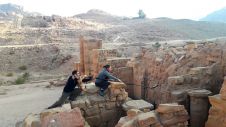Building the Capacity
GIM International Interviews Prof Stig Enemark, FIG President 2007-2010
During its 2006 Congress in Munich FIG General Assembly elected Prof. Stig Enemark as president for the term 2007 to 2010. Mr Enemark has longstanding international experience both as a career surveyor and university academic. His view is that “We can achieve a lot in this world; I’m available for that.” We interviewed him following his election.
First of all, I would like to congratulate you on behalf of the editorial board of GIM International.
Thanks! FIG is in a state of transition. For the first time in its history, not the venue of the next Congress, which will take place in 2010, was the subject of voting, but the election of president and three vice-presidents. This time there was a real campaign and I am very happy with the results of the elections. I would like to express my gratitude to departing FIG Council members and to the other candidates, T. N. Wong of Hong Kong and Ken Allred from Canada, who will remain members of the Council as vice-presidents. Matt Higgins (Australia) and Dr Dalal S. Alnaggar (Egypt) were elected as vice-presidents for 2007-2010 and Prof. Paul van der Molen (the Netherlands) as vice-president (2007-2008). Dr Chryssy Potsiou of Greece will represent the FIG Commissions on the Council.
During your campaign you suggested we should ‘fly high and keep our feet on the ground at the same time.’
FIG has really achieved a lot, as you can observe during this impressive meeting here in Munich, but as Prof. Holger Magel said during his closing speech, “we have so much more to do”. The new FIG Council faces a lot of responsibilities and challenges for the future. I’m very pleased that we have a strong Council again now, with a high level of experience, especially within the world forums in which we are engaged. As an international non-governmental organisation FIG must be in the position to continue its interaction with key players such as UN agencies and the World Bank, and with our sister organisations. FIG should be able to interact with politicians at national level to improve and promote the basic conditions for our services and our role in society. Since surveyors are providing a wide range of services and infrastructures, we should of course interact in a dialogue with the more than a hundred individual member associations, and individual surveyors, to make FIG an even more relevant and a proud icon for our profession. Indeed, we can fly high and keep our feet on the ground at the same time. That is the attitude of many surveyors; some could fly a little higher, in my opinion.
The overall theme you propose for the next period of office is ‘Building the Capacity’. Why this theme?
This theme has still to be discussed and agreed as part of the vision for the new council. I propose it because good governance, comprehensive land policies and sound land-administration institutions are essential components for addressing the problems relating to land management and land-information infrastructures. Both an efficient land market and an effective means of land-use control must be developed as basic tools for achieving a sustainable approach. Many technical issues, such as reference frameworks, applications of Global Navigation Satellite Systems, Information and Communication Technologies and low-cost/high-tech surveying methods are related here.
But capacity building is not just a matter of transferring knowledge at technological level?
Let me continue. In many countries, and especially in developing countries and countries in transition, the national capacity to manage land rights, restrictions and responsibilities is not well developed in terms of mature institutions and the necessary human resources and skills, including managerial and technical skills. In this regard, the capacity-building concept offers guidance for analysing and assessing capacity needs and for identifying an adequate response to these at societal, organisational and individual level. As a member of the Global Land Tool Network, and as a premium partner of UN Habitat, we have the responsibility to develop pro-poor, gendered, land tools. Dr Klaus Töpfer, general director of the United Nations Environment Programme, has stated very clearly here in Munich that secure tenure has the highest return of investment on the development agenda; it is relevant for the stability of many countries.
Mr Töpfer also said that capacity development was difficult to finance…
That is true. But in my opinion and according to my proposals, FIG can support the development of policies, strategies and frameworks for capacity development. Capacity development as a concept is closely related to education, training and Human Resource Development (HRD). However, as I said earlier, this conventional understanding has changed over recent years towards a broader and more holistic view, one covering social, organisational and educational aspects. ‘Capacity Assessment’ or diagnosis is an essential basis for the formulation of coherent strategies for capacity development. ‘Capacity Development’ is a concept that is broader than HRD, since it includes an emphasis on the overall system, environment and context within which the individual, organisations and societies operate and interact. The United Nations Development Programme (UNDP) and the Organisation for Economic Co-operation and Development (OECD) define capacity development as “… the process by which individuals, groups, organisations, institutions and societies increase their abilities to: perform core functions, solve problems, and define and achieve objectives; to understand and deal with their development needs in a broader context and in a sustainable manner.” This definition is generally accepted and adopted by various donors.
The UNDP definition talks about a ‘broader context’. What is meant here?
Even if the focus of concern is the specific capacity within an organisation to perform a particular function, one always has to keep in mind that any associated action should fit within overall policy and be coherent within the context of other activities. Capacity development does not, of course, imply that there is no capacity in existence; it also includes retaining and strengthening existing capacities of people and organisations to perform their tasks. Measures such as education and training become a means to an end, while the end itself is the capacity to achieve the identified development objectives over time, such as to establish and maintain national land-administration infrastructures for sustainable development.
There must be more priorities?
For sure. Promoting and enhancing the role of FIG means professional development, it means providing the international forum for development and innovation in all aspects of our surveying discipline. FIG needs a taskforce on organisational and institutional development. We have to strengthen the links between the global agenda and surveying grassroots. The FIG membership map contains some white spots (Figure 1). We have to promote the benefits of being a member of FIG, to further increase the member base and to further implement our communication and information policy. Promoting FIG as a truly global organisation means encouraging global representation on council and all commission officers encouraging global distribution of, and representation at, FIG conferences. We have to respect cultural and religious diversity.
What are your ambitions as FIG president for the coming four years?
We must respond to the Millennium Development Goals, I suggest by establishing a taskforce including UN agencies, and especially the World Bank. One activity in relation to this is a high-level FIG/World Bank conference in 2008. We have to revise our conference structure: for example, on even years a major world congress or major working week and on odd years a working week and regional conference in partnership with UN organisations. We have to enhance the profile of the technical programme at the conferences, to establish a FIG virtual journal with peer-reviewed scientific papers. FIG has a long history and is, perhaps for this reason, a vital, mature, dynamic organisation that is recognised all over the world. We as surveyors are needed to respond to many future challenges, many of which are land related. The future is in the hands of the youngsters. We have to support them, to enthuse them, to motivate them, to help them and to support them in joining our meetings. Politicians, as here in Munich, should be a normal appearance at FIG meetings. We can achieve a lot in this world; I’m available for that.

Value staying current with geomatics?
Stay on the map with our expertly curated newsletters.
We provide educational insights, industry updates, and inspiring stories to help you learn, grow, and reach your full potential in your field. Don't miss out - subscribe today and ensure you're always informed, educated, and inspired.
Choose your newsletter(s)
























